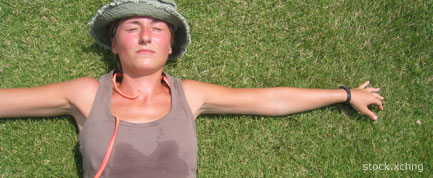Botox Stops Excessive Sweating

If anti-perspirant isn’t keeping you dry this summer, resulting in those oh-so-attractive pit stains, botox might be the new trendy answer.
Botox, short for Botulinum toxin, is a neurotoxin protein produced by the bacterium Clostridium botulinum. Though it is one of the most poisonous substances in the world, specialists use it in very small amounts to stop muscle spasms and most commonly to smooth out facial wrinkles by paralyzing the muscles that cause them to form.
Botox also is used to treat:
- migraine headaches
- uncontrollable blinking
- crossed eyes
- certain pain disorders
- and several disorders that cause repeated muscle twitching.
In the last few years, excessive sweating, or hyperhidrosis, has been added to that list. While the body usually sweats to cool itself when it is hot outside or in certain emotional states, such as nervousness, people with excessive sweating experience it independent of these factors and sometimes find their condition physically and socially uncomfortable.
Hyperhidrosis affects about 1 percent of the population, both men and women, most often under the arms and on the palms and feet.
Prescription anti-perspirants and pills are sometimes used to treat excessive sweating by temporarily reducing sweat production, but they can have side effects such as a dry mouth and eyes. A surgery called sympathectomy can prevent sweating by severing the nerves that signal the sweat glands.
Botox treats hyperhidrosis by blocking a neurotransmitter that stimulates the sweat glands, essentially paralyzing them. The treatment, which the U.S. Food and Drug Administration approved in 2004, involves several injections in the armpits and can last for up to eight months.
Sign up for the Live Science daily newsletter now
Get the world’s most fascinating discoveries delivered straight to your inbox.
“This is a popular treatment at this time of year for brides and grooms, as well as before prom or other events involving formalwear, for people who experience excessive sweating that can be a source of embarrassment or ruin expensive clothing,” said Erin Welch, a cosmetic dermatologist at the University of Texas Southwestern.
- Body Quiz 3: What the Parts Do
- The Sweatiest Cities in America
- Why Do You Stink?

Andrea Thompson is an associate editor at Scientific American, where she covers sustainability, energy and the environment. Prior to that, she was a senior writer covering climate science at Climate Central and a reporter and editor at Live Science, where she primarily covered Earth science and the environment. She holds a graduate degree in science health and environmental reporting from New York University, as well as a bachelor of science and and masters of science in atmospheric chemistry from the Georgia Institute of Technology.










